Auction Types
Selling coins/currency and precious metals can be profitable for affiliates who take the time to develop a working knowledge of these assets and are willing to take the time to research (the internet is a good resource) the value of these items prior to publishing an auction containing these assets.
Due to rampant fraud, scams, and counterfeit products associated with the coins/ currency/precious metals industry, Equip-Bid holds affiliates to a much higher standard when it comes to selling these items on Equip-Bid.com. Affiliates are responsible for not only fully disclosing all material information about an asset, but they are also responsible for verifying the information included in the item description. Verification requires the affiliate to independently research and guarantee the detail included in the lot description. The seller cannot be the verification source. Proof of authenticity or other claims made about an item in the description must be attached to the item description as a PDF.
“AS IS WHERE IS" does not apply for coins/precious metal sales.
Affiliates, who aren't interested in educating themselves on this topic or doing the required research on a consignor's coins/currency/precious metals, should not post these assets. Ignorance is not an acceptable excuse for failing to accurately identify and disclose details on coin/precious metal lots.
The following will provide additional details relating to sales of coin/currency/precious metal sales. This information is not intended to be all-inclusive; it is intended to provide affiliates with ideas, cautions, and a basic framework for handling these types of auctions.
Description Requirements for Coins / Currency / Precious Metals Sales
-
Type of coin/note/asset
-
Weight of precious metal in the item - required for every lot
-
Visible facts about the specific coin/note/asset - the year the coin was minted; mintmark; Note #; Series #; and any other identifying marks
-
Provide bidders with the precious metal content (%) of any asset that includes the words gold/silver or any other precious metal in the item description. The metal percentage must immediately follow the type of precious metal, as an example: Silver (90%).
-
If the item description refers to the condition or grade of a coin, the coin must be encased (coins graded by top grading companies are encased in plastic) with the grade certification indicated above the coin. The pictures of these graded coins must clearly show the grade as well as the name of the company that graded the coin.
Prohibited on Equip-Bid: Coins/Currency/Precious Metal Items
The reason for prohibiting certain items from being sold on Equip-Bid is to eliminate the negative repercussions that occur when bidders don't understand the value of the items they are bidding on. The ignorance level when it comes to precious metal values is high and widespread.
While it is tempting for affiliates to allow bidding to continue when the bids reach ridiculously high amounts for an item (exceeding item value by several multiples), it is a mistake to do so. Whenever affiliates recognize an inconsistency in the bidding on one of their coin/precious metal auctions, a red flag should go up and the affiliate should consider taking action. It is far better for an affiliate to halt an auction item due to a clear disconnect between the bid amount and the item value than it is to suffer the damage to their reputation that will occur when bidders recognize the affiliate allowed the auction to continue knowing the bidder made a gross error in judgment (i.e., item value = $1; winning bid price = $36).
It's important to remember, sellers come and go, an affiliate's reputation with bidders will decide the affiliate's future success.
Do Not Sell List: Coins/Currency/Precious Metals
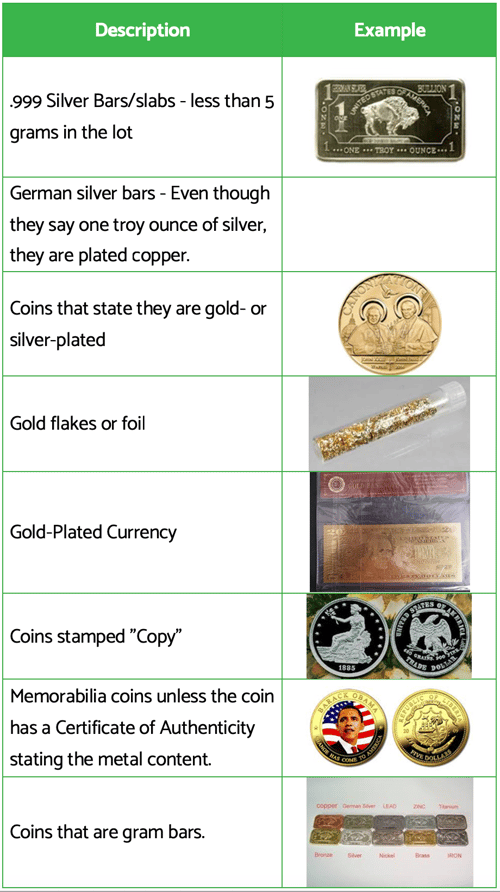
Additional Information Relating to Coin/Currency/Precious Metals
A good Calculator to use to figure out the value of coins is: http://www.coinflation.com/coins/silver_coin_calculator.html
How to Identify Real Silver
Genuine silver jewelry or silverware will be stamped with the number 800 or 925 or a promise that the silver is sterling (ex. Ster, Sterling, Stg). If the silver does not have an identifying mark, below are a couple of tests that may assist in determining real silver from fake silver.
-
Real silver coins emit a ringing sound, high pitched and bell-like when tapped together. If you flip a 1932-1964 quarter (90% silver) and a post-1965 quarter (90% copper), you should hear the difference immediately.
-
Real silver melts ice. Place an ice cube on a block of silver or a silver coin and watch the ice cube melt faster than it would if it were merely left out at room temperature. Silver melts ice quickly because it has very high thermal conductivity.
-
Real silver isn't magnetic. On real silver, the magnet will make a slow descent down a silver bar. On non-silver materials, it will either stick to the top of the bar or slide down very quickly.
Bullion: Safe Coins to Sell
Bullion, usually minted by the US Mint. Other countries will also produce Bullion Coins. A few examples are.
-
U.S. Gold Eagles
-
Canadian Gold Maples
-
U.S. Silver Eagles
-
Canadian Silver Maples
-
South African Krugerrand
-
China Pandas
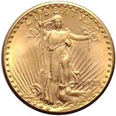
Precious Metal Content of Coins
Any coin except nickels and the pennies that were produced before 1964 is considered Junk Silver. They are 90% silver. Kennedy half dollars from 1965-1970 are 50% silver
.
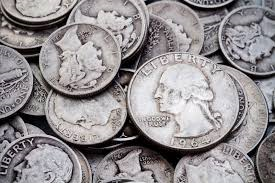
War Nickels are also silver and were produced from 1942-1945.
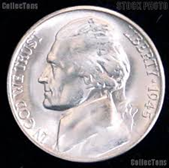
Proof sets from the US Mint
Every year the US mint will put out coin proof sets. Some are made of Silver and some are not. It is the responsibility of the affiliate to determine and disclose the silver content if selling these items.
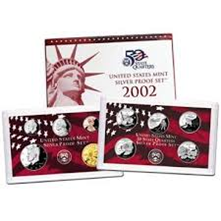
Numismatic Coins
These are coins that have collectible value in excess of its metal content because it is historical or rare. Such as an 1880 CC Morgan silver dollar.
Be cautious when writing the descriptions for these coins. Don't include information about the condition or grade for these coins, unless they were graded and encased by a reputable certified grading company.
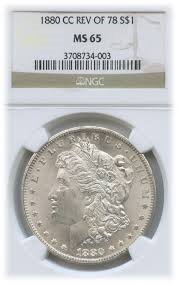
Firearms Policy
Selling firearms requires a Federal Firearms License. While federal and state regulations allow the sale of guns without an FFL in certain circumstances, Equip-Bid does not recognize these exceptions. If a gun is required to be sold through an FFL under any circumstances, it must be sold through an FFL on Equip-Bid.com. It is the responsibility of the affiliate to make sure the FFL they are using for their gun sales has an active Federal Firearms License; a list of active FFL's can be found on the ATF website: ATF List of Active FFL's. The FFL dealer must be identified by name and license number in the terms and conditions of the auction that contains the consigned firearms.
Any questions on the firearms policy should be directed to Equip-Bid.
Restricted/Illegal Assets
Affiliates are responsible for verifying the legality of all assets sold on their auctions. Federal, state, and local laws vary based on the location of the auction. Below are some examples (these are not comprehensive lists):
ILLEGAL
-
Dropdown cribs
-
Migratory waterfowl mounts
-
Alcohol (Collectible beer cans, decanters, and bottles may be sold, however, all need to be empty and descriptions must indicate that said items are empty.) (In rare instances, alcohol may be sold—usually only under government seizure order.)
-
Lawn Darts
-
USPS items
Restricted (requires a specific license or criteria be met):
-
Dropdown cribs
-
Used mattresses
-
Firearms
-
Gambling devices
-
Livestock
Equip-Bid's "Do Not Sell" items:
(IN ADDITION TO FEDERAL/STATE/LOCAL LAWS)
-
Distasteful/Offensive Items:
-
Nazi memorabilia (including any German WWII items)
-
Nudes, pornography, or risque items
-
Black Americana, etc.
-
Confederate Flags
-
Pets/non-livestock animals
-
Pallet Lots: Refers to the semi loads of damaged or returned items that can be purchased from places like Sam's Club or Jacob's Trading Company. Generally, these loads are delivered on pallets that are shrink-wrapped with a manifest. Affiliates cannot sell these pallets as delivered, due to the inspection requirements outlined in our “Auction Inspections" policy. However, affiliates may purchase these pallets and break them down and sell the useable products.
-
Certain Coins/Currency and Precious Metals (see Coins/Currency and Precious Metals Policy for detailed policies and info)
-
German silver bars - Even though they say one troy ounce of silver they are plated, copper
-
Coins that state they are gold or silver plated
-
Gold flakes or foil
-
Coins stamped 'Copy'
-
Memorabilia coins unless the coin has a Certificate of Authenticity stating the metal content
-
Coins that are gram bars
Storage Unit Auctions
In order to conduct a storage unit auction (like seen on TV), where people place bids on the contents of the unit based exclusively on what they can see from the doorway; the following 3 criteria must be met:
-
The consignor must be the storage facility (it cannot be the owner of the unit contents)
-
From the time the storage facility took possession of the unit, the owner was denied access to the unit contents.
-
The storage facility must assure the unit has remained “untouched” since they took possession of the unit.
If these 3 criteria can not be met, the traditional inspection rules will apply to the auction, and the bidder must have easy access to see and touch the contents of each lot during the inspection.
IMPORTANT: Due to copyright issues, don’t include references to “Storage Wars,” “Storage Hunters,” “Auction Hunters,” etc. in your auction titles or descriptions. Just say something like “as seen on TV.”

